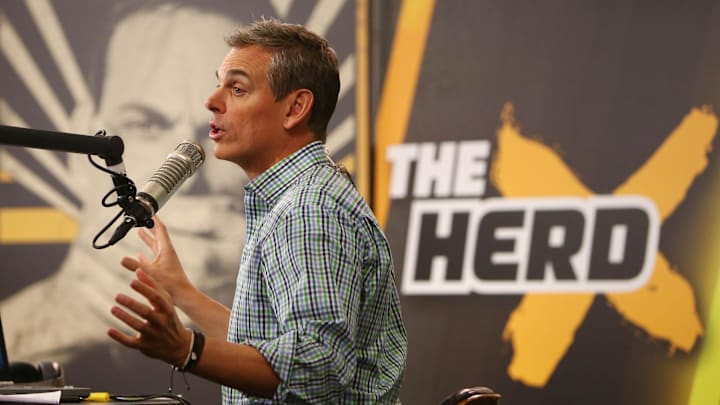When Colin Cowherd reacted to Oklahoma State’s decision to fire longtime head coach Mike Gundy, he didn’t hold back. On Big Noon Kickoff, Cowherd said:
"“I think it’s idiotic [firing Gundy]. … Who wins? The student athlete doesn’t win. This is college football; it’s not pro. … I can’t believe what they did to him. I think it sends a terrible message. College football is about the student athlete. Nobody wins here.”"Colin Cowherd
His comments reflect more than just disagreement with the decision. Cowherd sees the move as short-sighted and damaging, not only to the program’s reputation but to its future. In his eyes, this wasn’t just about performance on the field; it was about stability, culture, and how a university treats the people who help build its identity.
The Fallout of Firing a Beloved Coach
Cowherd’s comments highlight how deeply rooted Mike Gundy was in Oklahoma State’s football culture. After more than 20 years with the program, Gundy wasn’t just a coach—he was the face of the university’s football identity. Players respected him, many loved playing for him, and fans had become accustomed to his leadership. Removing someone so entrenched in the program sends a message that no one is truly safe, and it creates immediate uncertainty in the locker room.
For the student-athletes who committed to Oklahoma State under Gundy’s leadership, the move introduces doubt and disruption. It’s not just about who calls plays next week, this is about whether the values and vision they were sold on will remain intact. This kind of upheaval can hurt team morale, trigger transfers, and cloud the culture with mistrust. Cowherd’s larger point is clear: when you fire a coach who still commands the respect of his players, you risk damaging the very fabric of your program.
A Red Flag for Future Coaches
Cowherd didn’t just question the decision to fire Gundy—he questioned what it means for the future of the Oklahoma State job.
"“I don’t think this is an attractive job,” Cowherd said. “You fired your guy. He’s iconic. … Are they out of their mind?""Colin Cowherd
His concern is understandable. If a coach who gave two decades to the university, elevated the program, and endured both highs and lows can be dismissed during a rough stretch, what message does that send to the next man up?
A new head coach will need more than a contract; they’ll need confidence that Oklahoma State’s leadership is committed to a long-term rebuild. But that trust may not come easily after the way Gundy was let go. It also doesn’t help that the program recently hired new staff, only to now face the possibility of further shake-ups. Coaches looking at the job might think twice about stepping into a situation that feels unstable or impatient.
Was a Change Still Necessary?
While Cowherd strongly opposed the decision, it’s worth acknowledging that things weren’t trending in the right direction. Oklahoma State went 3–9 in 2024 and started the 2025 season 1–2. The on-field product had stalled, and there were few signs of imminent turnaround. For the university, waiting could have meant missing out on a fresh start or falling further behind in a rapidly changing college football landscape.
Even if the timing felt harsh or abrupt, some might argue the school made a proactive move to position itself better in the coaching market and the transfer portal. Getting a head start on hiring “their guy” might help Oklahoma State reset before the cycle gets too competitive. It’s a tough call between loyalty and results but in this case, results won.
The Balance Between Loyalty and Vision
What Cowherd seems most upset about is the emotional and cultural toll of the decision. Gundy was an institution at Oklahoma State. His firing, to Cowherd, represents the cold business side of college football overtaking the relationship-based heart of it. While administrators are tasked with thinking about wins, revenue, and relevance, media figures like Cowherd remind fans that college football is still supposed to be about student-athletes, mentorship, and continuity.
Yet the university may see things differently. In their view, leadership is about knowing when to pivot, even if the short-term optics are messy. That pivot only works, though, if it's followed by intentional investment. The next coach will need more than a paycheck. OSU will have to supply the tools to rebuild, modernize, and reenergize a shaken program.
Conclusion: The Gamble That Comes With Change
Colin Cowherd believes Oklahoma State made a mistake and not just a tactical one, but a foundational one. He sees the firing of Mike Gundy as a breach of trust with players, fans, and future coaches alike. He argues that nobody wins in a scenario like this, and that the message it sends is toxic for a program that now faces uncertainty on multiple fronts.
Still, it’s possible that the school felt it had no choice. The performance on the field was regressing, and waiting longer might have only deepened the hole. Whether or not the decision was “idiotic” will ultimately depend on who they hire next and how that coach is supported. One thing is clear: Oklahoma State has made its move. Now they must prove it was worth the cost.
